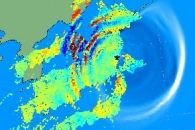The 2011 Tōhoku earthquake and tsunami was one of the biggest in modern history; the earthquake even moved Earth's axis for a very small, but measurable bit. The four years since then is not enough for hard climate data, but enough to have some insight to how the weather was influenced. So did it influence weather in any way that could be seen as "impact on climate"? If yes, how?
-
$\begingroup$ The article provided by @gansub demonstrates that there is a precedent for a link between destructive earthquake/tsunami events and shifts (temporary or otherwise) in the climate. I have also shared this in my Twitter network - very good and interesting question! $\endgroup$– user889Commented Mar 12, 2015 at 8:48
-
2$\begingroup$ @gansub: it's bit too scientific for me - no problem, just add translation to layman's terms. Also, this is a regional study and I'm more interested in a global view. This might be acceptable, but some summary on global scale (e.g. did it affect ice melting in Arctic as well?) would be better. $\endgroup$– Pavel V.Commented Mar 12, 2015 at 9:03
-
$\begingroup$ There are several case studies if large earthquake/tsunami are considered from all over the world - it is conceivable that there is indeed a world wide study - or an opportunity to bring together case studies into a global perspective. $\endgroup$– user889Commented Mar 12, 2015 at 9:10
-
$\begingroup$ I have lived near Plainview, TX most if my life, even as a kid. I have NEVER seen conditions such as the years after 2011 in the weather patterns I see today. Another look in the effects 0f the 2011 Japanese earthquake needs to be examined. $\endgroup$– Ronald KirchhoffCommented Dec 2, 2022 at 4:34
2 Answers
Local effects are definitely possible, mainly from the tsunami itself - turbulence in the air from the waves and increased evaporation from flooded areas after. However, it appears that the earthquake and tsunami has had no significant effect on the world's weather, particularly in the long term. According to the Lamont-Doherty Earth Observatory, Columbia University web-article, Can Big Earthquakes Disrupt World Weather?, a key point is that although the earthquake released a massive amount of energy, it is not enough to disrupt the energy balance of the atmosphere.
A particular point is that one of the significant effects - the axial shift from the earthquake, is, according to the article, minimal compared to natural cyclical axial fluctuations. The article also mentions that other major earthquake and tsunami events have the same minimal effects.
Although, some studies such as what gansub mentioned in comments, Impact of tsunami on Tamil Nadu Monsoon Rainfall, suggest that the tsunami itself can cause disruptions to local and regional climatic systems -particularly with rainfall patterns. This is an ongoing study by the University of Canterbury's Dr Iman Soltanzadeh research "The Atmospheric Impacts of Volcano and Large Tsunamis" where land use modifications due to a tsunami would affect local and regional climate and weather patterns.
However, the effects on the thinner upper atmosphere were a bit more pronounced according to NASA observations reported in the web-article Quake and Tsunami make waves in the Atmosphere, causing ripples in the ionosphere (~85km above the surface), as can be seen in the image below:

The quake caused acoustic and Rayleigh waves that reached the ionosphere in about 10 minutes, and the rolling motion of the tsunami caused gravity waves to propogate to the ionosphere in about 30-40 minutes, continuing westward even after the tsunami was stopped by the east coast of Japan.
The most significant aspect of NASA's findings can be interpreted that as the waves (all types) propogate through the atmosphere from the earthquake rupture and tsunami to the ionosphere, they appear to cause no significant climatic disruption to the lower near-surface and even the middle layers of the atmosphere, further emphasising the conclusions made by the Lamont-Doherty Earth Observatory that large earthquakes and associated tsunami do not cause any long term affects on weather patterns.
-
1$\begingroup$ +1, excellent. As a non-climatologist (just an archaeologist with some knowledge of paleoclimatology), I don't understand your last point: what effect do the ripples in ionosphere have on climate here on/near Earth's surface? Add a bit summarizing it and I'll accept it. The rest is OK for me. $\endgroup$– Pavel V.Commented Mar 14, 2015 at 7:16
-
$\begingroup$ No worries @PavelV. I have just added a bit, let me know if it helps explain the significance of NASA's findings. $\endgroup$– user889Commented Mar 14, 2015 at 8:04
-
$\begingroup$ Excellent, exactly what I need, accepted. $\endgroup$– Pavel V.Commented Mar 14, 2015 at 15:41
False! the tsunami caused major upwellings of cold subsurface waters and even slowed, temporarily stopped or shifted some ocean currents. All this led to the drought that plagued the west coast for years, until the Humbolt current resumed it's normal path. Many other recent weather anomalies since 2011 can be blamed on this Tsunami and it's lasting effects.
-
$\begingroup$ I realize you don't have the points to post this as a comment, but this should be a comment. I'd also recommend "not entirely true" or something to that effect, rather than "false" as it's less abrupt, but that's a pet peeve of mine, or, go into more detail, add a few references and make this an answer. $\endgroup$– userLTKCommented Apr 26, 2018 at 3:23
-
3$\begingroup$ This also needs references. Especially when you challenge someone else's answer, back it up with data. $\endgroup$ Commented Apr 26, 2018 at 7:32